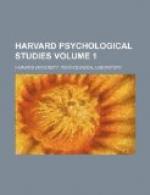All logical knowledge is divided into Theoretical and Practical. The modern classifications have mostly excluded the practical sciences from the system, rightly insisting that no facts are known in the practical sciences which are not in principle covered by the theoretical sciences; it is art which is superadded, but not a new kind of knowledge. This is quite true so far as a classification of objects of knowledge is in question, but as soon as logical tasks as such are to be classified and different aspects count as different sciences, then it becomes desirable to discriminate between the sciences which take the attitude of theoretical interest and those which consider the same facts as related to certain human ends. But we may at first consider the theoretical sciences only. They deal either with the objectified world, with objects of consciousness which are describable and explainable, or with the subjectivistic world of real life in which all reality is experienced as will and as object of will, in which everything is to be understood by interpretation of its meaning. In other words, we deal in one case with phenomena and in the other with purposes.
The further subdivision must be the same for both groups—that which is merely individual and that which is ‘overindividual’; we prefer the latter term to the word ‘general,’ to indicate at once that not a numerical but a teleological difference is in question. A phenomenon is given to overindividual consciousness if it is experienced with the understanding that it can be an object for every one whom we acknowledge as subject; and a purpose is given to overindividual will in so far as it is conceived as ultimately belonging to every subject which we acknowledge. The overindividual phenomena are, of course, the physical objects, the individual phenomena the psychical objects, the overindividual purposes are the norms, the individual purposes are the acts which constitute the historical world. We have thus four fundamental groups: the physical, the psychological, the normative and the historical sciences.




